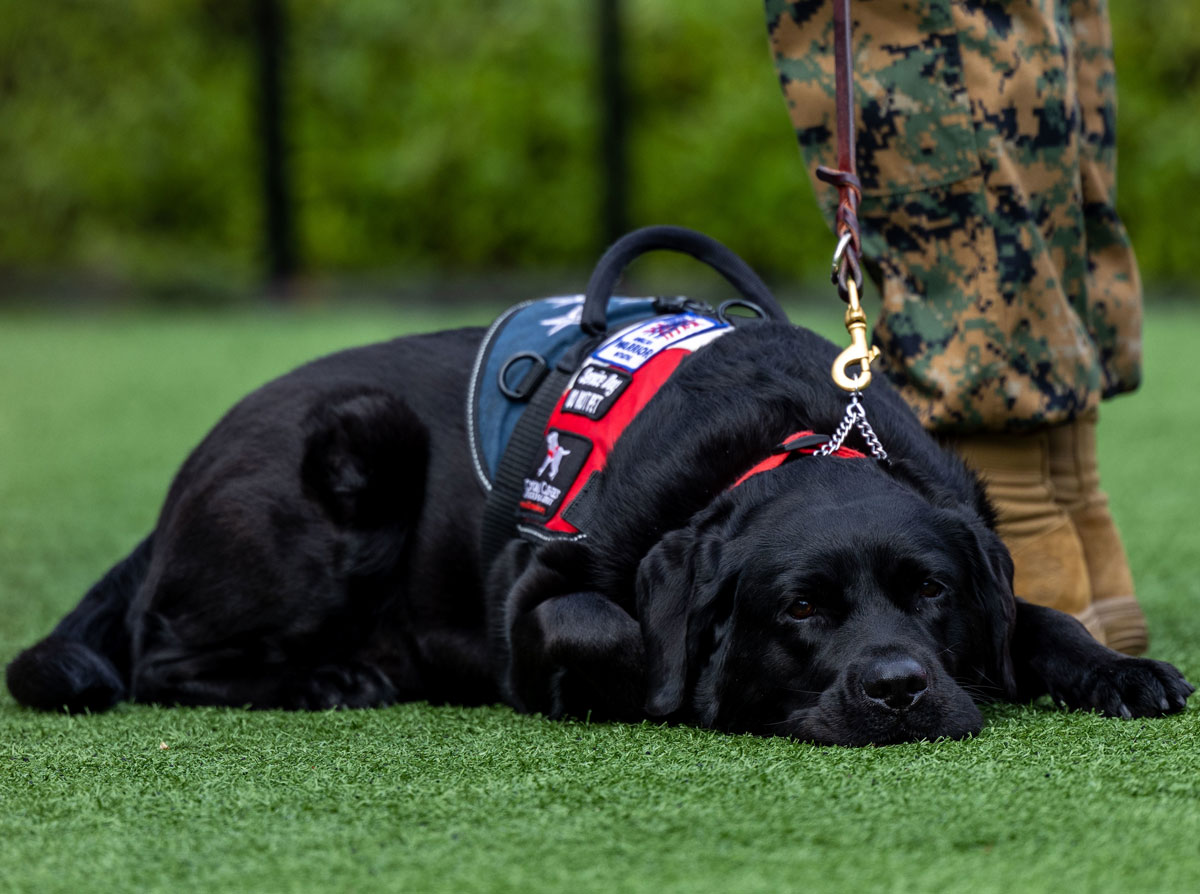REGION — Post-traumatic stress disorder is a highly misunderstood illness that approximately 6% of the United States population experiences at least once in their lifetimes.
For the many service members and veterans who struggle with PTSD, asking for help can be a challenge due to the stigmas often associated with the illness and its debilitating symptoms.
“You don’t have control over your own biological functions and it starts to snowball,” said retired Marine Corps Maj. Robert O’Berg, who was diagnosed with PTSD a few years ago. “I’d get between four and five hours of sleep with sleeping meds, and it creates this cycle where the following day you’re groggy, irritable, and not pleasant to be around.”
Post-traumatic stress disorder typically occurs following a shocking, often life-threatening event. While anyone can be diagnosed with PTSD, the Department of Veteran Affairs states that veterans, especially those who have experienced combat, are more likely to suffer from the disorder than the average civilian due to their frequent exposure to potentially traumatic events.
According to the National Institute of Mental Health, most people who experience traumatic events don’t develop chronic PTSD, but those who do experience a variety of symptoms such as flashbacks, bad dreams, insomnia, frightening thoughts, self-isolation, avoiding reminders of the event, being easily startled, feeling on edge, angry outbursts, loss of interest in things, negative thoughts about oneself and memory loss about the event.
PTSD: Overcoming fear
Serving on multiple deployments during his nearly 20-year military career, O’Berg said he sustained several physical and mental injuries before his retirement with Wounded Warrior Battalion West in January.
While stationed in Okinawa, Japan, O’Berg, largely isolated from his family during 40 straight days of quarantine due to the COVID-19 pandemic, began to experience “hidden wounds,” like sleep disturbances and nightmares.
“My situation made healing more difficult,” he said.

O’Berg eventually sought emergency medical help for his illness after realizing he could no longer connect with his family in the present moment. The Marine Corps then transferred O’Berg to Wounded Warrior Battalion West, where he started a treatment plan at Naval Medical Center San Diego.
O’Berg was placed with a recovery care team, a recovery care coordinator, a licensed clinical social worker and Harvest, a psychiatric service dog trained to help people with anxiety disorders, depression or PTSD.
For O’Berg, Harvest’s presence releases dopamine and serotonin, boosting these neurotransmitters often depleted in individuals suffering from major depressive disorders. Harvest can also read O’Berg’s emotions, comfort him when he is down and force him out of bed when necessary. According to O’Berg, Harvest was one of the best things that happened to him.
|
||
Do you know anyone who has suffered from post-traumatic stress disorder (PTSD)? |
||
| Poll ends May 04, 2023 | ||
| Yes | ||
| No | ||
But even after starting his long road to recovery, O’Berg said it took him some time to overcome the fears so many veterans and service members experience when contemplating their own mental health. The fear of appearing weak, fear of others finding out, and fear of losing a military career often prevent veterans and active-duty soldiers from seeking help.
Kirsten White, associate director of the Steven A. Cohen Military Family Clinic in Oceanside, said many of her clients hesitate to seek the clinic’s help for their PTSD symptoms.
“People tend to be afraid of seeking help or admitting there is an issue or problem when it might make them look weak,” White said. “This is why we often refer to PTSD symptoms as ‘invisible wounds’ – people don’t see them the way you see physical wounds, and when there are others who went through similar events but don’t have diagnosed PTSD, those who do often wonder, ‘What’s wrong with me,’ which may keep them from going and asking for help.”
White said one of the common misconceptions about PTSD is that most combat veterans fall somewhere on the disorder’s spectrum. But according to a Cohen Veteran Clinic study, PTSD impacts between 11% and 20% of Iraq and Afghanistan war veterans, 12% of Gulf War (Desert Storm) veterans and about 15% of Vietnam veterans.

The Cohen Veteran Clinic study also showed roughly one in four Americans believe most people with PTSD are violent and dangerous, another false stigma associated with the disorder.
“The vast majority (of veterans with PTSD) aren’t violent or dangerous,” White said.
What is true, but also widely unknown, is that PTSD is entirely treatable. In general, the VA estimates about 6 out of every 100 people (or 6% of the U.S. adult population) will have PTSD at some point in their lives. In 2020, about 13 million Americans had PTSD, and most will likely recover with treatment.
“(PTSD’s) not a life sentence,” White said.
The Cohen Clinic provides three evidence-based treatment options: cognitive behavioral therapy to help with problem-solving and navigating difficult thoughts and feelings; cognitive processing therapy for challenging unhelpful beliefs related to the trauma; and prolonged exposure therapy to allow individuals to confront their fears.
‘Soul wounds’
O’Berg also highlighted another type of non-physical wound many combat veterans experience after transitioning back to civilian life: moral injury.
“We often call them ‘soul wounds,’” O’Berg said.
The VA defines “moral injury” as when someone’s actions, or inaction, contradict their deeply held beliefs during traumatic events. O’Berg explained how these “soul wounds” run deep for many veterans of the Afghanistan War, the nation’s longest-running war, particularly after the U.S. military’s chaotic exit in 2021.
While moral injury is not synonymous with PTSD, many veterans experience an overlap of the two illnesses, according to the VA.
O’Berg said he also deals with moral injury. In 2003, the Brooklyn native joined the Marines to honor the lives of his cousins, Dennis Patrick O’Berg and Christopher Mozzilo, New York City firefighters killed during the terrorist attacks on 9/11.
But following his retirement from the Wounded Warrior Regiment in January, O’Berg said he continued to experience thoughts that his military service was all for nothing, a notion that still bothers him.

Ultimately, O’Berg believes serving his country was an honorable decision but acknowledged the struggles facing combat veterans returning home need more attention.
Today, O’Berg lives with his wife and children in San Marcos, and he is pursuing his doctorate in leadership at the University of San Diego this fall.
In addition to understanding the need for support for veterans, O’Berg also pointed out the need to understand the struggles of military caregivers. The weight that many veterans and service members carry while experiencing PTSD and moral injury is often partly shared by their loved ones or caregivers who look after them.
“We might refer to caregivers as ‘hidden helpers,’ and just like those invisible wounds, not everyone sees the amount of work that goes into being a caregiver,” White said.
Both O’Berg and White noted that caregiver fatigue — family members feeling burned out and without someone to talk to about their struggles — is something many of these hidden helpers can experience. The Cohen Clinic also allows caregivers to speak about their efforts.
Veterans needing immediate help can call the Veterans Crisis Line by dialing 988 and pressing 1 for 24/7 support.
For local assistance, veterans, service members and their families can contact the Oceanside Cohen Clinic by calling 760-418-4611 or [email protected].



